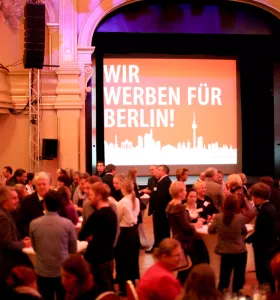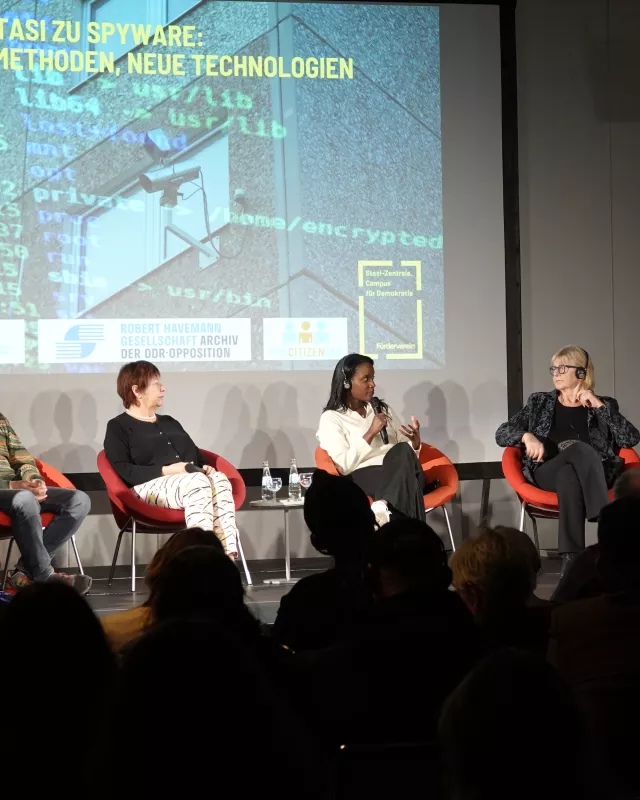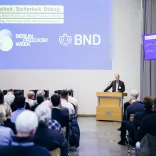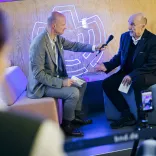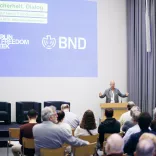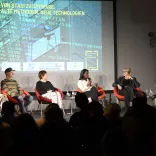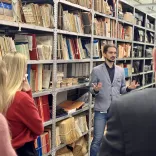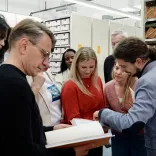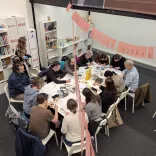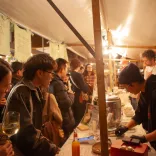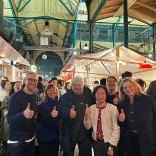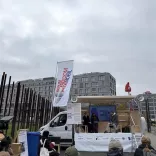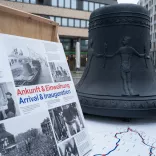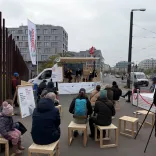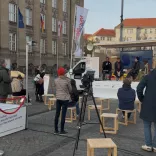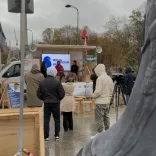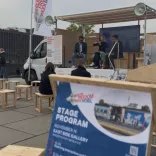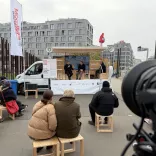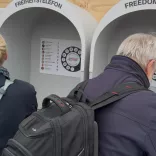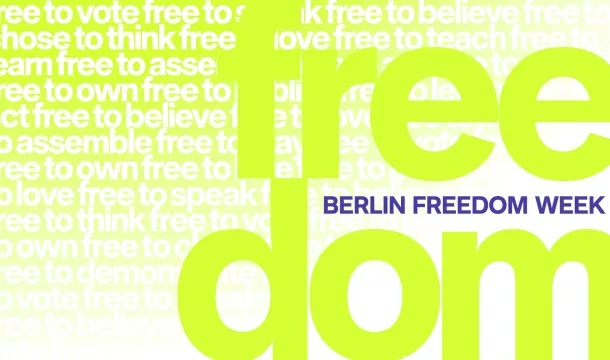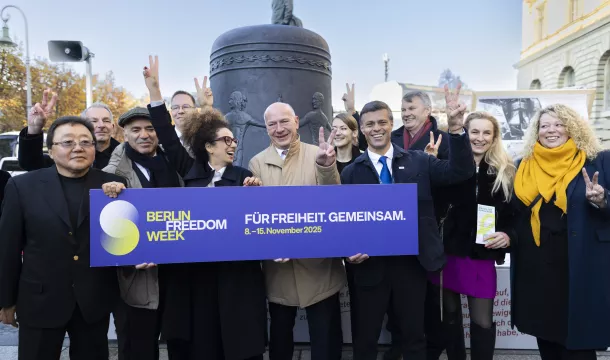Berlin looks back on a successful first Berlin Freedom Week: Thousands celebrated freedom and democracy
- 170 events by more than 90 partners at 90 locations – attracting over 10,000 visitors
- Strong media and social media response: millions of impressions and international attention
- A powerful signal for freedom and democracy: Berlin’s Governing Mayor calls for a continuation of Berlin Freedom Week
Berlin, 18 November 2025 With an impressive response across the German capital, in the media, and online, the first Berlin Freedom Week came to a close this weekend. More than 170 events by over 90 partners at more than 90 locations attracted a broad audience to the city of freedom – ranging from conferences and dialogue formats to exhibitions, guided tours, readings, film, theatre, and other art projects, as well as culinary events. The first Berlin Freedom Week offered a platform for dialogue with dissidents and defenders of democracy worldwide. The Berlin Freedom Mobile, featuring the symbolic Freedom Bell, also inspired and attracted countless visitors and Berliners alike. Patron of the festival week and Berlin’s Governing Mayor, Kai Wegner, announced that Berlin Freedom Week is set to take place annually in the future, around the anniversary of the fall of the Berlin Wall.
Since the opening of Berlin Freedom Week on 8 November, numerous German and international media outlets have covered the initiative, reaching an audience of more than 92 million – from news agencies, local TV stations Spiegel, and radio stations, to Berlin’s daily newspapers and international media such as Deutsche Welle, The Telegraph, The Independent, Financial Times, and El País. Both media and visitors praised the inspiring initiative and the diversity of its programme, which strengthened Berlin’s reputation as the “capital of liberty” (The Independent). Across social media, the events sparked engagement and comments highlighting the courage of freedom fighters and the relevance of the initiative.
“Paris has Fashion Week – Berlin now has Freedom Week,” said Iranian women’s rights activist Masih Alinejad, co-founder of the World Liberty Congress.
Burkhard Kieker, CEO of visitBerlin, concluded: “Berlin Freedom Week sent a strong signal for democracy and freedom from Berlin. We are proud and deeply moved. Freedom is the most beautiful trademark of our city.”
Antje Schippmann, Managing Director of the Axel Springer Freedom Foundation, emphasized: “Berlin Freedom Week has shown how alive this city’s legacy of freedom remains. For one week, Berlin became the capital for all those currently standing up for the defense of freedom and democracy – from Tehran and Beijing to Caracas, and from the frontlines in Ukraine to Taiwan. The international response confirms that Berlin has once again become a place where the free world comes together.”
Dr. Ellen Madeker from Airbnb (one of the event’s sponsors) wrote on LinkedIn: “Berlin – where courage takes the stage. (…) Berlin Freedom Week is the city’s latest event series, bringing together freedom fighters and human rights defenders from around the world – each a reminder of what true bravery looks like. Congratulations to the City of Berlin, visitBerlin, Burkhard Kieker, and Antje Schippmann for the idea and launch of Freedom Week. Berlin has always stood for openness and courage – and this week proved it once again.”
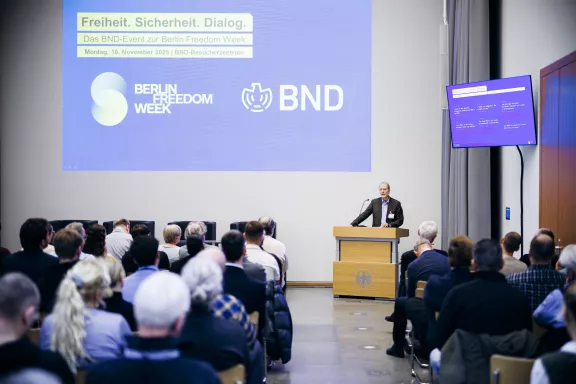
A wide range of event formats took place at numerous fascinating locations across the city during Berlin Freedom Week – from the former Stasi headquarters at the Campus for Democracy in Berlin-Lichtenberg and the former field station Berlin on Teufelsberg, to Markthalle Neun, Berlin’s escape tunnels, the Berlin House of Representatives, the German Bundestag, the Foundation New Synagogue Berlin – Centrum Judaicum, as well as several embassies, cinemas, and the visitor centre of the Federal Intelligence Service. Visitors praised the approach of publicly discussing and celebrating the themes of freedom and democracy through a diverse range of events that gave these topics a visible platform in the city.
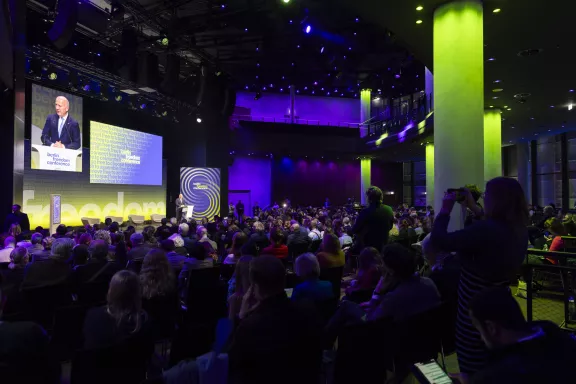
Highlight: The Berlin Freedom Conference at the Gasometer
A highlight of Berlin Freedom Week was the Berlin Freedom Conference, held on 10 November at the Gasometer on the EUREF Campus in Schöneberg, which brought together 1,000 participants. More than 60 speakers from German and international politics, business, science, civil society, and the media discussed solutions to strengthen freedom and democracy worldwide. Among the speakers were Iranian journalist and women’s rights activist Masih Alinejad, former Taiwanese President Tsai Ing-wen, Venezuelan opposition leaders Edmundo González, María Corina Machado, and Leopoldo López, Russian dissident Garry Kasparov, Ukrainian Nobel Peace Prize laureate Oleksandra Matviichuk, and many other defenders of democracy from around the world. From German politics, Berlin’s Governing Mayor Kai Wegner, along with Julia Klöckner and Karin Prien, addressed ways to protect freedom and democracy in times of growing threats from autocracies. In the evening, the Axel Springer Freedom Foundation presented its annual Award for Courage to Ekrem İmamoğlu, the imprisoned mayor of Berlin’s partner city Istanbul, and to his wife Dilek İmamoğlu. The award ceremony took place at Berlin City Hall.
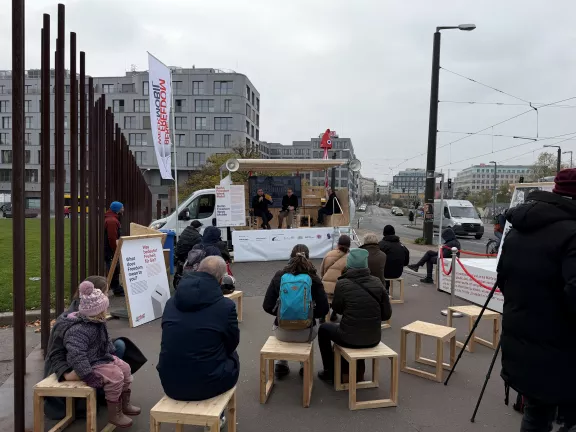
Crowd-puller: The Berlin Freedom Mobile on tour through the city
The Berlin Freedom Mobile, featuring a replica of the historic Freedom Bell and a daily live programme, became a visible symbol of the week – carrying both historical and contemporary voices of freedom into the heart of the city. It stopped at key locations across Berlin, from the Campus for Democracy in Lichtenberg and the Berlin Wall Memorial to Bebelplatz, the East Side Gallery, and Berlin-Schöneberg City Hall.
Many Berliners and visitors took the opportunity to engage in conversations with international speakers, share their own stories, or take photos with the Freedom Bell. Despite the chilly November weather, the mobile attracted great interest, drawing around 600 participants overall. All live talk formats will soon be made available online.
A particularly moving moment was the performance of a Ukrainian women’s choir at Bebelplatz. The mobile format brought the week’s themes directly to people across all districts – from east to west, from past to present – showcasing how vibrant Berlin’s commitment to freedom and democracy remains today.
Frank Ebert, Berlin Commissioner for the Reappraisal of the SED Dictatorship, said: “With Berlin Freedom Week, we wanted to highlight the efforts of all those—past and present—who have fought for a life in freedom. We have certainly succeeded in doing so, and it motivates us to remind those who live in freedom of its value and to support those who continue to fight for it.”
Rebecca Hernandez Garcia, Robert Havemann Society, added: “Berlin Freedom Week has shown how closely the struggles for freedom of yesterday and today are intertwined, and that the memory of the Peaceful Revolution and the fall of the Berlin Wall continues to be a powerful source of inspiration for international movements for freedom and democracy. As the archive of the GDR opposition, we preserve and share these historical experiences so that they continue to guide future generations and strengthen the global commitment to human rights.”
Lillemor Mallau from the initiative "Meine Schönhauser Allee" and the Colosseum cinema, one of the event’s partners, said: “Berlin Freedom Week has impressively demonstrated how essential culture is to our freedom—and the power it can unleash. Strong stories connect people across borders, reminding us what is at stake. Film in particular is a powerful voice that inspires us to stand together for democracy and freedom.”
Organisers, media partners and supporters
The patron of Berlin Freedom Week is Berlin’s Governing Mayor Kai Wegner. The first Berlin Freedom Week was initiated by visitBerlin, the Axel Springer Freedom Foundation, and the World Liberty Congress, together with the Berlin Commissioner for the Reappraisal of the SED Dictatorship and the Robert Havemann Society.
Media partners included POLITICO, DIE ZEIT, WELT, Tagesspiegel, radio3, and WALL. Supporters of the first Berlin Freedom Week were Deutsche Postcode Lotterie, Airbnb, Berliner Sparkasse, and Jacob Waitz Industrie GmbH.
The Berlin Freedom Conference is a joint initiative by visitBerlin, the Axel Springer Freedom Foundation, and the World Liberty Congress. It was supported by the LOTTO Foundation Berlin, with Airbnb and Berliner Sparkasse as sponsoring partners.
Further information
More information about Berlin Freedom Week is available at berlin-freedom-week.com. Impressions can be found on Instagram at @berlinfreedomweek, and image material on Berlin Freedom Week and the Berlin Freedom Conference is available in the media service at about.visitBerlin.de/medienservice-berlin-freedom-week#Bildmaterial.
Initiators
Berlin Freedom Week
Berlin Freedom Week (8–15 November 2025) was a first-time event week that focuses on the idea of freedom. Through a diverse programme of conferences, art, culture and public dialogue, it aims to inspire Berliners and international guests and promote exchange on the importance of democratic values in today's world. berlin-freedom-week.com
Berlin Freedom Conference
The Berlin Freedom Conference took place for the first time on 10 November 2025 at the Gasometer Schöneberg. It brought together leading figures from politics, business, civil society, culture and the media to jointly create new democratic alliances and powerfully advance the global commitment to freedom and democracy. More information at berlin-freedom-conference.com.
World Liberty Congress
The World Liberty Congress is the largest global democracy alliance, with more than 200 dissidents from more than 50 autocratically ruled countries around the world. It took take place on 8 and 9 November 2025 in the Berlin House of Representatives. Its goal is to support the fight for freedom in autocratic regimes, promote international solidarity and develop a common strategy for the advancement of democracy. worldlibertycongress.org
Axel Springer Freedom Foundation
The Axel Springer Freedom Foundation is a non-profit organization dedicated to supporting human rights defenders living under authoritarian regimes. Defending freedom and democracy — and showing solidarity with those who suffer under autocratic rule — was a guiding principle for the company’s founder, Axel Springer. Today, the foundation carries this legacy forward with renewed determination. Backed by a strong advisory board of experienced human rights advocates, the Axel Springer Freedom Foundation organizes events, installations, and publications. It also raises funds to directly support the work of dissidents and their organizations. freedom.axelspringer.com/en/
Robert-Havemann-Gesellschaft Society
The Robert Havemann Society documents the history and experiences of opposition and resistance under the communist dictatorship and promotes the values of the Peaceful Revolution: democracy, freedom, and human rights. With its Archive of the GDR Opposition — the most comprehensive collection of materials on opposition and resistance to the communist dictatorship since 1945 — and its extensive expertise in curating exhibitions and events, publishing, and maintaining a strong digital presence, the Robert Havemann Society serves as a central point of reference in the field of historical reappraisal and research. havemann-gesellschaft.de
Berlin Commissioner for the Reappraisal of the SED Dictatorship
Since March 2023, Frank Ebert has served as the Berlin Commissioner for the Reappraisal of the SED Dictatorship. He was nominated by the Berlin Senate and appointed by the Berlin House of Representatives. Ebert, a former member of the East German opposition, has long been committed to educating the public about the SED regime. The Commissioner operates independently, both professionally and politically. His three core responsibilities include: advising victims of the SED dictatorship and public institutions; supporting educational and memorial projects about the East German regime; and offering the public political and historical education programs. He is also a point of contact for individuals seeking rehabilitation or compensation for political imprisonment, applying for victim pensions, or accessing their Stasi files. In addition, he advises authorities on matters relating to GDR history and supports the work of the Stasi Records Archive. aufarbeitung-berlin.de

